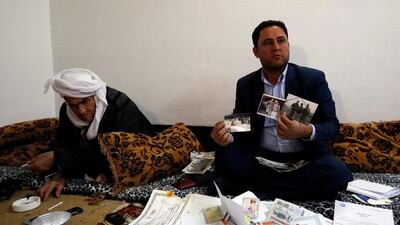NEW YORK // President Donald Trump’s executive order closing US borders to refugees was only a few hours old before the legal challenges began.
Lawyers representing two Iraqi refugees who were held at New York’s Kennedy airport filed a writ seeking their release and also made the first move to start a class action with the intention of acting for all refugees and immigrants detained unlawfully at US ports of entry, the New York Times reported. Both the Iraqis fear for their lives if forced to return to Iraq.
The president’s order blocking all refugees from entering the country for 120 days — or indefinitely, for those from Syria — has left people already travelling to the US in legal limbo.
Hameed Khalid Darweesh worked for the US government for ten years in his native Iraq. He was detained when he arrived at Kennedy airport on Friday night. Fellow Iraqi Haider Sameer Abdulkhaleq Alshawi was hoping to join his wife — who had worked for a US contractor — and his son in the US. He was also stopped at Kennedy airport on Friday
Their lawyers say they were not allowed to meet their clients. When one of them, Mark Doss, who is the supervising attorney at the International Refugee Assistance Project, asked with whom he should speak to resolve the impasse, a customs and border protection agent replied, “Mr President. Call Mr Trump.”
“These are people with valid visas and legitimate refugee claims who have already been determined by the state department and the department of homeland security to be admissible and to be allowed to enter the US,” said Mr Doss told the newspaper. “They are being unlawfully detained.”
Mr Darweesh, 53, was eventually released on Saturday.
After the US invaded Iraq in 2003, legislators created two refugee programmes to protect the thousands of Iraqis who risked their lives helping Americans in Iraq. The Special Immigrant Visa programme stopped accepting applications in 2014 but the Direct Access Programme for US-Affiliated Iraqis was continuing — until Friday.
From 2003, Mr Darweesh spent a decade as an interpreter for the US army and also worked as an engineer and contractor and says he was twice directly targeted because of his connections to the American military. He was granted a special immigrant visa on January 20, President Trump’s inauguration day and arrived in New York with his wife and three children on Friday evening. They were allowed in. He was not.
Speaking outside the airport after he was eventually released he said he harboured no ill feelings after his ordeal. “America is the greatest nation, the greatest people in the world,” he said.
Mr Alshawi was already on the plane to New York when Mr Trump signed the document that now prevents him from joining his wife and son in Houston. In a brief phone call to his wife, he said he had tried to apply for asylum but was told he would have to go back to Iraq.
In Baghdad, an Iraqi who applied for refugee status under the Direct Access programme said, “Mr Trump killed our dreams. I don’t have any hope to go to the United States.”
He had received threats by texts on his mobile phone because his wife was a bookkeeper for the United Atates Agency for International Development (USAID). He applied to emigrate in 2013. The same year, he was shot in the head while driving to work. He survived but is now deaf in one ear and lives in fear of retribution by militants in Iraq.
In Cairo, the Sharef family was barred from flying to New York on Saturday, despite having visas. Fuad Sharef, 51, his wife and their three children were instead forced to board a flight back to Erbil in Iraqi Kurdistan.
According to airport officials, when a flight manifest was sent to JFK airport, the instruction came back that the family was not to board the EgyptAir flight to New York. The Sharefs had special immigrant visas and planned to settle and start a new life in Nashville, Tennessee. Now back in Erbil, Mr Sharef, a manager in the pharmaceutical industry who had previously worked for an NGO subcontracted by the US aid agency, said he was devastated.
“I had sold my house, my car, my furniture. I resigned from work and so did my wife. I took my children out of school. Donald Trump destroyed my life, my family’s life. I used to think America was a state of institutions but it’s as though it’s a dictatorship,” he said. “For a decision like this to come out and be implemented immediately, and against whom? Against a valid visa holder. I put my life at risk, working with the Americans at a time that it could have got you killed.”
More than 7,000 Iraqis, many of them interpreters for the US military, have resettled in the United States under the Special Immigrant Visa programme since 2008, while another 500 or so are still being processed, according to state department figures. Another 58,000 Iraqis were awaiting interviews under the Direct Access programme, according to the International Refugee Assistance Project.
Allen Vaught, a former US army captain who served in Fallujah in 2003 said, “A lot of translators were trying to get out of there because they had a mark on their head for working with US. forces. They’re viewed as collaborators.” Two of the interpreters he employed were executed by Iraqi militia, he added. The executive order could endanger American troops by making it harder to recruit local support in war zones.
* The National with Reuters

